Carbohydrates are often a hot topic in the world of nutrition and dieting. With the popularity of low-carb diets and intermittent fasting, many people are curious about the potential side effects of cutting out or drastically reducing carbs. While some individuals may experience short-term benefits such as quick weight loss, the long-term consequences of eliminating carbs entirely can be concerning. In this comprehensive guide, we will explore what can happen to your body if you stop eating carbs. We’ll cover a range of potential issues—from dizziness and decreased energy levels to heart health and metabolism changes—and discuss healthy carb alternatives that support overall wellbeing.
You May Feel Dizzy and Lightheaded Without Carbs
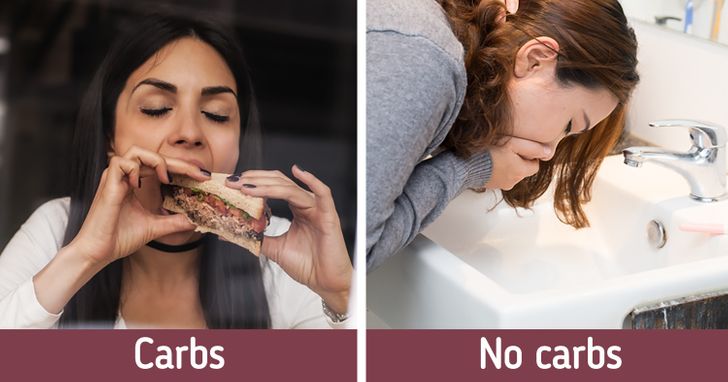
When you cut out carbohydrates, your body loses its primary source of quick energy. Carbohydrates are easily broken down into glucose, the fuel that powers your brain and muscles. Without this immediate energy source, many people report feeling dizzy or lightheaded.
Why Does This Happen?
Glucose Deficiency: Carbohydrates are the main source of glucose. When you stop eating them, your blood sugar levels can drop significantly, leading to symptoms such as dizziness, fatigue, and even confusion.
Electrolyte Imbalance: Low-carb diets can also lead to a reduction in insulin levels, which causes your kidneys to excrete excess sodium. A drop in sodium and other electrolytes may exacerbate feelings of dizziness.
Adaptation Phase: During the initial phase of a low-carb diet, your body shifts its energy source from glucose to fats and ketones—a process called ketosis. This transition can temporarily reduce energy levels and lead to dizziness until your body adapts.
For more detailed information on blood sugar management and low-carb diet side effects, WebMD provides an excellent overview of the physiological changes that occur during carb restriction.
It Will Be Harder For You To Stay Active Without Adequate Carbohydrate Intake

Carbohydrates are crucial for maintaining high energy levels, especially during physical activities. When you eliminate carbs, you might find it increasingly difficult to sustain energy during workouts or even throughout daily activities.
Energy Depletion and Reduced Performance:
Muscle Glycogen Stores: Carbohydrates are stored in muscles as glycogen, which is the primary fuel during high-intensity exercise. Without enough carbs, these glycogen reserves deplete, leading to reduced performance and increased fatigue.
Low Energy Levels: Many athletes and active individuals report a significant drop in energy when following a strict low-carb diet. This lack of energy can result in decreased endurance and strength, making it harder to maintain an active lifestyle.
Mental Fatigue: Carbs play a vital role in brain function. Reduced carbohydrate intake can lead to mental fatigue, making it harder to concentrate and stay motivated for physical activities.
For further insights into the relationship between carb intake and exercise performance, Healthline explains how carbohydrates fuel your workouts and why maintaining a balanced diet is essential for staying active.
It’s Not Good For Your Heart: The Cardiovascular Implications of a Carb-Free Diet
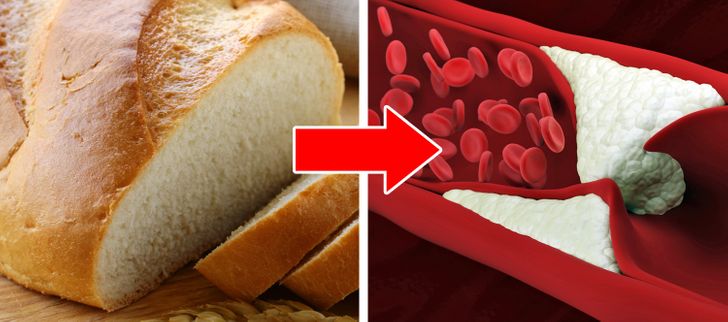
While many low-carb diets are associated with weight loss and improved metabolic markers, completely eliminating carbohydrates can have unintended consequences for your heart. Carbohydrates, particularly those from whole, unprocessed sources, provide essential nutrients that support cardiovascular health.
How Carbs Affect Heart Health:
Nutrient-Rich Foods: Whole grains, fruits, and vegetables are not only high in carbs but also rich in fiber, vitamins, and antioxidants that help reduce inflammation and lower the risk of heart disease.
Cholesterol Levels: Some low-carb diets promote high intakes of saturated fats and proteins from animal sources, which can lead to an unfavorable lipid profile. Elevated LDL cholesterol and reduced HDL cholesterol are risk factors for cardiovascular disease.
Blood Pressure Regulation: Many healthy carbohydrates are high in potassium and magnesium, which are essential for maintaining normal blood pressure. A lack of these nutrients can contribute to hypertension.
Studies from reputable sources like the American Heart Association emphasize the importance of including healthy carbohydrates in your diet to support overall cardiovascular health. A balanced approach that integrates whole grains and fiber-rich foods is key to protecting your heart while managing weight.
Your Metabolism May Slow Down Without Carbs
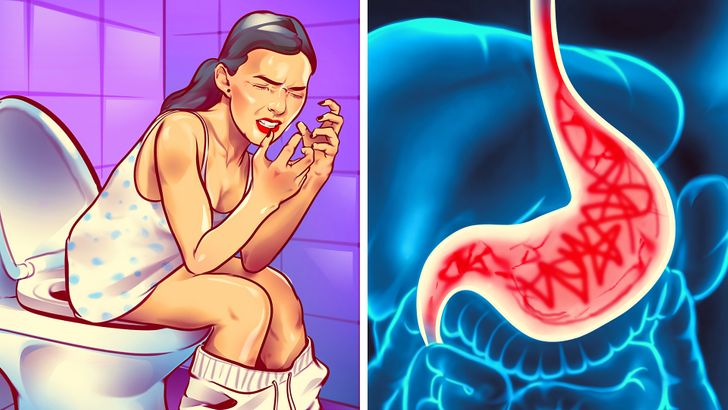
A sudden and drastic reduction in carbohydrate intake can have a notable effect on your metabolism. Your body’s metabolic rate is closely tied to your energy intake and the macronutrient balance in your diet.
Understanding Metabolic Changes:
Adaptive Thermogenesis: When you drastically cut carbs, your body may respond by reducing its metabolic rate—a phenomenon known as adaptive thermogenesis. This is a survival mechanism that conserves energy during periods of perceived starvation.
Hormonal Imbalance: Carbohydrate restriction can alter hormone levels, including thyroid hormones and leptin, which play crucial roles in regulating metabolism. A decrease in these hormones can lead to a slower metabolism over time.
Muscle Loss: Carbohydrates help preserve muscle mass by providing the energy needed during workouts. Without sufficient carbs, your body might break down muscle tissue for energy, further slowing down your metabolic rate.
For more detailed information on metabolism and the effects of low-carb diets, Mayo Clinic offers comprehensive insights into how different macronutrients impact metabolic health.
You Might Experience Muscle Cramps and Weakness Without Carbs
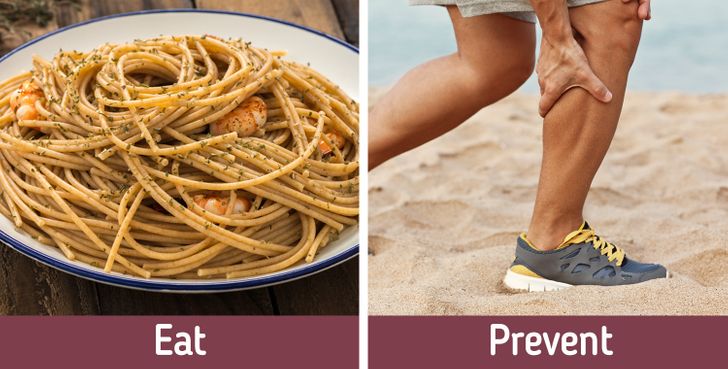
Carbohydrates play a vital role in fueling your muscles. Without an adequate supply of carbs, your muscles may not function optimally, leading to cramps, weakness, and general discomfort.
Why Muscle Cramps Occur:
Glycogen Depletion: Muscles rely on glycogen, a form of stored carbohydrate, for energy. When glycogen stores are depleted, your muscles are more likely to cramp during physical activity.
Electrolyte Imbalance: As mentioned earlier, low-carb diets can lead to a loss of electrolytes such as sodium, potassium, and magnesium. These minerals are essential for muscle contraction and relaxation. An imbalance can trigger muscle cramps and spasms.
Reduced Energy Supply: Without sufficient carbohydrates, the energy available for muscle function decreases, leading to early fatigue and weakness during exercise.
For more insights into the connection between carbohydrate intake and muscle health, Verywell Fit provides valuable tips on preventing muscle cramps on a low-carb diet.
Your Breath May Smell Bad: Understanding Keto Breath and Carbohydrate Withdrawal
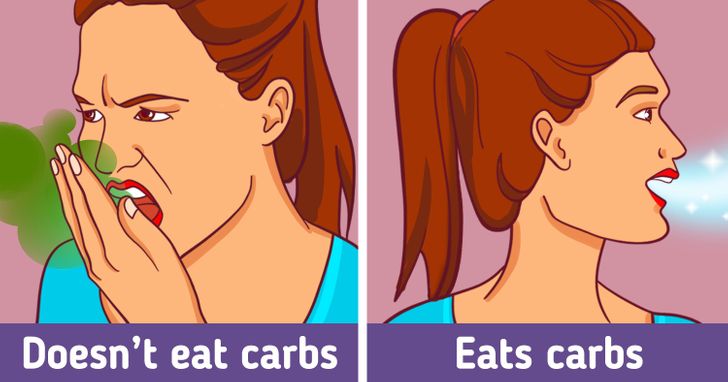
One of the more surprising side effects of cutting out carbohydrates is the development of bad breath. This condition, often referred to as “keto breath,” occurs when your body enters ketosis—a state where it burns fat for energy in the absence of carbs.
What Causes Keto Breath?
Acetone Production: In ketosis, your liver produces ketones, including acetone, which can be expelled through your breath, giving it a distinct, unpleasant odor.
Dry Mouth: Low-carb diets can lead to dehydration, resulting in a dry mouth that exacerbates bad breath by reducing saliva production. Saliva is important for neutralizing odors and washing away bacteria.
Dietary Changes: The shift from a carb-rich diet to one focused on fats and proteins can alter the oral environment, promoting the growth of odor-causing bacteria.
While keto breath is typically temporary and tends to resolve as your body adapts to a low-carb state, it can be bothersome. For strategies to combat keto breath and maintain fresh breath on a low-carb diet, Medical News Today offers practical advice and home remedies.
Healthy Carbs That Will Benefit Your Health: Smart Alternatives for a Balanced Diet
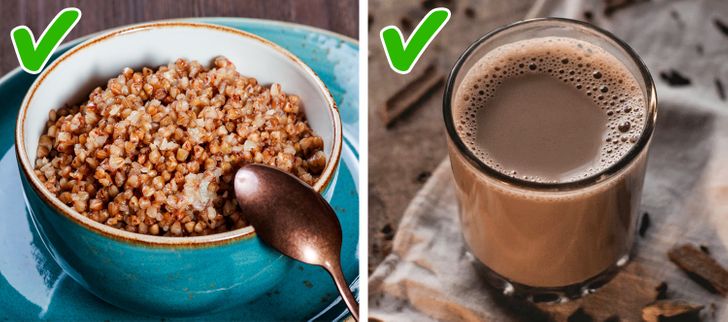
Not all carbohydrates are created equal. While cutting out refined carbs and sugars can be beneficial, eliminating all carbs—including those from nutrient-rich sources—can have detrimental effects on your health. It’s important to differentiate between harmful refined carbs and healthy, complex carbohydrates.
Nutrient-Dense Carbohydrate Sources:
Whole Grains: Foods like quinoa, brown rice, oats, and barley are excellent sources of fiber, vitamins, and minerals. They provide sustained energy without spiking blood sugar levels.
Fruits: Fresh fruits, particularly berries, apples, and pears, are rich in antioxidants and fiber, making them a vital part of a balanced diet.
Vegetables: Starchy vegetables such as sweet potatoes, carrots, and squash offer a healthy dose of complex carbs along with essential nutrients.
Legumes: Beans, lentils, and chickpeas are high in protein and fiber, making them an excellent alternative to processed carbs.
Nuts and Seeds: While primarily known for their healthy fats, many nuts and seeds also contain beneficial carbohydrates and fiber.
Why Healthy Carbs Matter:
- Energy and Brain Function: Healthy carbs are critical for maintaining energy levels and cognitive function. They provide the necessary fuel for the brain, helping improve focus and mental clarity.
- Digestive Health: The fiber found in whole, complex carbs supports digestive health by promoting regular bowel movements and feeding beneficial gut bacteria.
- Long-Term Weight Management: Incorporating healthy carbs into your diet helps maintain a balanced calorie intake while preventing the extreme hunger often associated with very low-carb diets.
- Reduced Inflammation: Many whole foods rich in carbohydrates also contain antioxidants that combat inflammation and support overall health.
For more information on healthy carbohydrate sources and balanced nutrition, visit Harvard T.H. Chan School of Public Health and Healthline’s guide to healthy carbs.
Conclusion: Balancing Carbohydrate Intake for Optimal Health
While low-carb and ketogenic diets have become popular for rapid weight loss, it’s crucial to understand the potential drawbacks of completely eliminating carbohydrates. Carbs play an essential role in providing energy, supporting brain function, and maintaining overall health. If you stop eating carbs entirely, you may experience side effects such as dizziness, reduced physical activity, heart complications, a slowed metabolism, muscle cramps, and even bad breath.
However, the key is balance. Focusing on healthy, nutrient-dense carbohydrates—such as whole grains, fruits, vegetables, legumes, and nuts—can provide the energy and nutrients your body needs while still allowing for effective weight management. Instead of completely cutting out carbs, consider reducing your intake of refined sugars and processed foods while emphasizing complex carbs that support long-term health.
Ultimately, the best approach to nutrition is one that is balanced, sustainable, and tailored to your individual needs. Listen to your body, and if you decide to experiment with a low-carb diet, do so under the guidance of a healthcare professional. With the right balance of macronutrients, you can achieve your weight loss goals without compromising your overall health.
For more expert advice on nutrition and balanced diets, explore reputable sources like Mayo Clinic and Healthline. By understanding the role of carbohydrates in your body and making informed choices, you can enjoy the benefits of a healthy, balanced diet that supports both weight loss and overall wellness.









